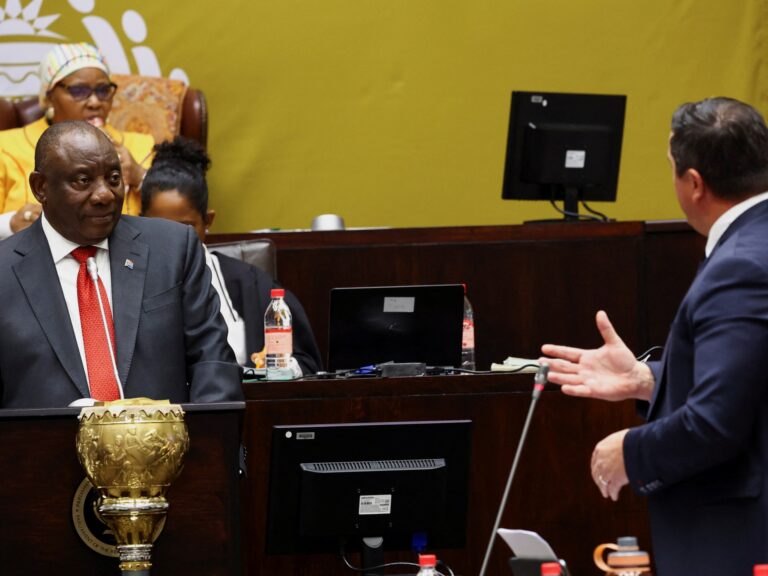Cape Town, South Africa – When South Africa, led by the ruling African National Congress (ANC), brought Israel to International Court of Justice (ICJ) in January on allegations of genocide in Gaza, it attracted applause from many countries, particularly in the South.
At home, however, support was more muted among the country’s other political parties. The ANC’s main rival at the time, the right-wing Democratic Alliance (DA), opposed the measure – although it later called on Israel to adhere to the ICJ’s interim rulings. The right-wing populist Patriotic Alliance (PA) called South Africa’s decision a “joke”.
Today, five months later, the ANC has brought together a coalition government running the country with the DA and, to a lesser extent, the PA and the nationalist Inkatha Freedom Party (IFP), raising concerns about how South Africa’s approach to regard to Israel and Palestine could change.
The ANC failed to gain a majority in May’s elections for the first time since the end of apartheid.
The ANC insists it will not change its position in favor of Palestine despite the new coalition agreement.
Yet analysts say coalition-led South Africa may have to make internal compromises in pursuing its Palestinian policy after months of global efforts to hold Israel accountable for its attack on Gaza , which killed more than 37,000 people.

“Will the ANC abandon its foreign policy?
The DA and IFP sought to remain neutral in the war while the AP in particular expressed support for Israel.
In the final coalition agreement, a foreign policy clause was inserted in which the ANC and its partners agreed on the principles on which foreign policy would be based.
“A foreign policy based on human rights, constitutionalism, national interest, solidarity, peaceful resolution of conflicts, to achieve African Agenda 2063, South-South, North-South and African cooperation, multilateralism and a just, peaceful and equitable world” the agreement said.
Although the ANC admitted the DA was unlikely to change its position on Israel and Palestine, it insisted it would not abandon its long-standing solidarity with the Palestinians.
“Will the ANC abandon its foreign policy ideas? We’re not going to change that. Will the DA change from what it represents? It won’t change that,” ANC secretary-general Fikile Mbalula told the media.
He described suggestions that the ANC could reverse its critical stance on Israel as “misleading and populist”.
“We will continue to show solidarity with the Palestinian people. It was not an electoral position,” Mbalula insisted.
South Africa’s support for Palestine is deeply rooted in its own decades-long struggle against apartheid, with President Cyril Ramaphosa repeatedly calling Israel an apartheid state.

Double standards
The DA has moved away from its initial unwavering support for Israel and maintained a middle-ground call for “peace.”
In the run-up to the election, the ANC criticized the DA for taking a bold stance on the Ukraine war – DA leader John Steenhuisen visited Kiev to show support for the Russian war – without adopt a similar position in favor of Palestine. .
The DA, in turn, accused the ANC of being unprincipled in its foreign policy due to what it called a “warm” relationship with Russian President Vladimir Putin.
The ANC government has condemned Russia’s invasion of Ukraine and Ramaphosa has sought to play a peacemaking role in the conflict while remaining friendly with Putin and Russia.
While the ANC signed the agreement with its coalition partners on Friday that enabled Ramaphosa’s re-election, it affirmed its solidarity with Palestine during Ukrainian President Volodymyr Zelensky’s global peace summit in Switzerland, but took a hard line against Israel.
South Africa’s representative at the summit, Sydney Mufamadi, who is Ramaphosa’s national security adviser, rejected the proposal. final statement because of Israel’s participation.
In a statement after the Burgenstock summit, Mufumadi denounced what he called an international double standard in the uniform and equitable implementation of international law.
He said he found it surprising that Israel was present and signed the communiqué “just days after a credible high committee appointed by the United Nations concluded that it had, among other atrocious crimes, committed the crime of ‘extermination’.
“The ANC depends on the DA”
Siphamandla Zondi, professor of politics and international relations at the University of Johannesburg, said that while the ANC as a party will not abandon its position on Palestine, it will have to compromise on the actions of the government.

“I think the ANC might not be able to continue with its trials and push really, really hard against Israel,” he told Al Jazeera.
“It could go back to a principled position that says, ‘This war must end,’ almost similar to the position on Ukraine. »
At the ICJ, South Africa accused Israel of genocide, and its thesis was supported by more than one a dozen countries.
Although the DA initially criticized the government’s decision to take Israel to the ICJ, it said it would respect the court’s decision on the issue. Zondi said the DA’s position on Palestine was consistent with that of center-right parties across the world and that while they condemned the violence, they were not comfortable characterizing the actions as ‘Israel of genocide.
“The coalition agreement will certainly have an impact on the government’s case before the ICJ. The ANC reports to the DA,” he said.
Zondi said while the ANC was unlikely to hand over the international relations ministerial portfolio to its coalition partners, the DA would influence policy decisions.
According to the coalition agreement, the unity government’s decisions must be taken by “sufficient consensus” with the support of 60 percent of the parties signing the agreement. This means that the ANC will not be able to make decisions alone. If the ANC and IFP agree on something but the DA disagrees, a decision could be adopted; but if DA and IFP do not agree, the ANC cannot act alone.


